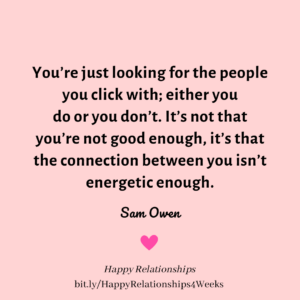
The Dating Journey
You get chatting with someone online and you arrange a first date. You get nervous and excited.
Will they be as good looking in real life as they are in their profile pictures? Will you feel a mutual physical attraction? Will the conversation flow as it has done online? Will you feel those magical butterflies?
Much to your pleasant surprise, that first date goes really well. ‘Finally’, you think. ‘Someone I genuinely click with.’
Then days go by and they don’t contact you as quickly as you’d hoped or expected. But then they do. Two whole weeks later. Irritating. A quiet alarm bell rings in your mind. But they give you a reason that kind of seems understandable. Actually, you’re not sure what you make of the reason but, ever hopeful, or feeling desperate, you throw caution to the wind and decide to give them a second date.
You meet again, the physical chemistry is there, the conversation flows, you have a really nice time. Later that day when back in your own home, you remind yourself of how this is the best connection you’ve felt with anyone in a while.
Another two weeks pass by. They get in touch again with more excuses but you’re now more intoxicated by the memories of the chemistry you’ve felt and so you chat excitedly on text. They mention meeting up again and you arrange a third date for the following week.
Before you meet up again you’re feeling increasingly uncomfortable about the discrepancy between the person you’re with during the dates and the person you hear from, or don’t hear from, in between those dates.
You call a friend. You tell her about the situation and ask her opinion. You still feel conflicted. A little lighter, but still uncomfortable.
Now, you have a choice here.
You know yourself well enough to know that if you keep dating them, and fall for them, you may end up spending, let’s say, four months dating them, and if it ends you’ll spend another four months getting over them and rebuilding how you now feel about yourself, your future, dating, and getting mentally resilient to start dating all over again.
That’s eight months of your life. Gone. Eight months.
Maybe it’s more for you. Maybe it’s less. You do the maths for you.
The relationship investment equation:
Time spent chatting and dating + Time spent rebuilding yourself if it doesn’t work out
= Time spent on a relationship that didn’t work out
Sometimes you know you invested more time than necessary on a relationship, and that’s when you feel hacked off. Like when you know you could have learnt the necessary lessons life was teaching you, sooner, and grown, quicker.
But alas, the past is now gone. If you’ve at least learnt that you have made this mistake in the past and have learnt from it, then it was all worth it. Don’t beat yourself up because you needed that in order to move forward more sleekly.
What you do have control over is what you do from this moment forward.
Sometimes people aren’t messing you around, it just takes you both time to work out that you’re just not a good match for one another. Other times you haven’t been proactive enough to find out if you are a good match.
Sometimes you really don’t know that someone is intentionally messing you around because they are so skilled at it. But other times, you ignore the red flags you have actually noticed.
Save Yourself Time (And Unnecessary Heartache)
So let’s look at how you can minimise the time you spend on dates and relationships that aren’t right for you and your relationship goals, whether that’s by spotting the mismatches or spotting the ‘players’.
In 2018, researchers at the University of Exeter uncovered 10 questions every couple should ask* to help them work out if their romantic relationship or marriage will last. If you’re a serious dater, their findings will be important to you.
At the time, Jan Ewing, one of the researchers involved, and I, both appeared on BBC Breakfast to discuss their findings. And what they found resonated with my professional experience, both when working as a dating coach and as a relationships coach (helping my clients with their relationships with themselves and others).
Now I’m revisiting those questions with your dating journey in mind, and by that I mean, helping you to uncover valuable information whether you’re:
- connecting online or offline before a first date,
- going on a first date, second date, third date, etc,
- or are a handful of months into dating someone.
If you can gauge how confidently you answer ‘yes’ to their 10 ‘critical’ questions, you can either:
- save yourself precious time and heartache by quickly moving on from people who you can clearly tell are not going to be a good match long-term (‘prune’); or
- calmly, confidently and excitedly continue getting to know those who seem like they really could be the person you’ve dreamed of spending your life with (‘pursue’).
Of course there are some unknowns when it comes to lasting love, things that you cannot always predict, something echoed in the research report.
For example, the researchers explain what their interviewees referred to as luck: ‘…that nothing ‘too bad’ had come along to disrupt their relationship (e.g. aggressive personality change or a third party who was too tempting) and in the sense that they had grown together simultaneously in the same direction…’
However, asking yourself the 10 questions below, can help sway your odds massively in your favour, saving time and heartache and making dating, and life, much more enjoyable.
First, About The Relationship Study
The study was conducted over a period of 10 years, utilising information from divorce lawyers/mediators and judges. The research team also interviewed 43 couples married for 10 years, or who had separated during this period, as well as 10 other couples in same-sex and opposite-sex relationships, who had been living together, married or in a civil partnership for at least 15 years.
From their research they concluded that there are ten critical questions to ask. Those 10 questions are:
- Are my partner and I a ‘good fit’?
- Do we have a strong basis of friendship?
- Do we want the same things in our relationship and out of life?
- Are our expectations realistic?
- Do we generally see the best in each other?
- Do we both work at keeping our relationship vibrant?
- Do we both feel we can discuss things freely and raise issues with each other?
- Are we both committed to working through hard times?
- When we face stressful circumstances would we pull together to get through it?
- Do we each have supportive others around us?
Dating Questions You Can Ask Based On Their 10 Questions Couples Should Ask
Using these research insights for your own learning and happiness, let’s look at examples of questions you could ask a potential mate, date, or your new girlfriend/boyfriend, to help uncover if there is longevity in the relationship. Thus working out early on if you should prune or pursue.
I’m pretty sure that as you read some of the below you will be thinking, ‘Crikey, Sam, I can’t ask that!’ ha ha.
But you can. You just need to make sure the timing and delivery is right, and that you rephrase the below questions to reflect the way you authentically speak. It’s got to sound like you and it’s got to feel comfortable in the flow of whatever conversations you’re having.
Please don’t sit there trying to go through the entire list. Cringe! On one occasion you may get to ask one or two of the below, on another day you might ask a few more. And the questions can be asked in any order.
Keep it casual, keep it authentically you, and keep your eyes and ears open. Watch and listen to their responses. How they look/behave when they answer will sometimes be as telling as what they actually say verbally, if not more so. All of that information is important. And sometimes it’s what they’re not saying that is the most insightful.
So remember, speak how you speak, adapt these questions to fit your personality, write down your versions, and then use them when you naturally can, face-to-face, online or offline.
Example Dating Questions Inspired By The Long-term Relationships Research
1. Are my partner and I a ‘good fit’?
Ask questions around values, interests, dreams, goals, and attitudes.
For example:
- What are some things you absolutely want to achieve during your lifetime?
- What type of people do you get on with?
- How important is personal development to you?
- What are some of the main values you live your life by?
- What do you want to be remembered for after your death?
- What purpose do you want your life to have?
2. Do we have a strong basis of friendship?
Find out how compassionate, empowering, appreciative, respectful, trustworthy and helpful they are. This can mean finding out how they behaved in relationships with ex-partners and how they behave with their loved ones when those loved ones are experiencing challenges or are themselves being challenging.
For example:
- How would you describe the sort of partner you were to your exes?
- What would you do differently in future romantic relationships based on what you’ve learnt from your past?
- Would you say you’re someone your friends and family members can rely on or would you like to be as you evolve through life?
3. Do we want the same things in our relationship and out of life?
The questions around point 1 above are relevant here also, but in addition to having shared values, interests, dreams and goals, ask questions about what sort of day-to-day relationship they envisage, what sort of lifestyle they’re looking for, what sort of life they want for themselves.
For example:
- How do you like to spend your spare time?
- How do you see yourself spending time with a partner?
- Do you want to be married by a certain age or is marriage not for you?
- Do you see yourself settling down in a suburb or in a city centre?
- Do you want to live your whole life here in this country or move abroad one day?
- Would you like life to be one big party?
4. Are our expectations realistic?
Glean whether the dates by which you want to achieve your big milestone goals are in sync, and whether what you expect from one other as a teammate is in sync?
For example:
- Is it important to you how much your partner earns?
- Would you expect your future wife to be a stay at home mum or would you rather she went back to work after a year or so?
- You mentioned you do want to get married, do you see yourself cohabiting first or not?
- Do you have a goal for when you want to be married by and have children by?
5. Do we generally see the best in each other?
Ask questions around how they respond to the world in general if you’ve only just met, or ask questions that are more personal to you if you’ve been dating for a little while.
For example:
- What emotions do you tend to feel when you are faced with challenges in life?
- Are you a glass half full or a glass half empty type of person?
- What’s my most annoying habit as far as you’re concerned?
- What are my strengths as far as you can see right now?
6. Do we both work at keeping our relationship vibrant?
Find out their idea of long-term love to see if it is proactive or defeatist.
For example:
- Do you think romance can be kept alive for a lifetime?
- How do you think you keep a relationship fresh and exciting for life?
7. Do we both feel we can discuss things freely and raise issues with each other?
Work out how they approach conflict.
For example:
- How do you navigate conversations where there is a difference of opinion?
- If you don’t like something your partner’s doing, what do you tend to do about it?
8. Are we both committed to working through hard times?
Work out how they approach challenges.
For example:
- What have you learnt about yourself and how you deal with relationship challenges when you’ve dated in the past?
- What do you think is the best way to deal with opposing ideas between romantic partners?
9. When we face stressful circumstances would we pull together to get through it?
Work out how they handle serious, threatening situations.
For example:
- What sort of partner would bring out the best in you if you were in a stressful or life or death situation?
10. Do we each have supportive others around us?
Find out what sort of social/support network they have.
For example:
- Who are you close to?
- What do you love about your close relationships?
- Have you ever been through really tough times that made you see who was truly there for you and who wasn’t and if so, who proved they really had your back?
Keep Asking
As the relationship progresses, keep checking in with yourself with the 10 questions from the research. Doing so will highlight areas, if any, that you need to work on and/or that they need to work on.
When people stop trying or worse, go out of their way to sabotage your relationship to ensure it doesn’t work, then that in itself is a very clear message.
Own Your Worth, Own Your Time
If you’re a serious dater looking for lasting love, have a thoughtful, self-compassionate approach.
It’s okay to ask important questions.
It’s important to find out if you’re a good match and can build a successful relationship together.
Doing so saves your time and theirs.
Reference
* Barlow, A., Ewing, J., Janssens, A., & Blake, S. (2018). The Shackleton Relationships Project-Report and Key Findings. Exeter: University of Exeter. https://ore.exeter.ac.uk/repository/bitstream/handle/10871/33708/Shackleton_Report__Final%20website%2026-07-18_.pdf?sequence=1&isAllowed=y














